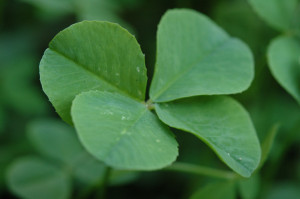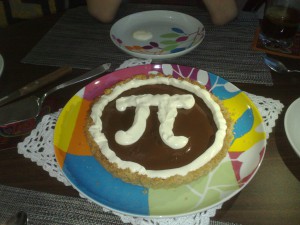Tomorrow is St. Patrick’s Day, which has gotten us thinking about luck and luck words.
The phrase luck of the Irish is commonly thought to mean “extreme good fortune.” However, according to Edward T. O’Donnell, an Associate Professor of History at Holy Cross College and author of 1001 Things Everyone Should Know About Irish American History, the term has not an Irish origin but “a happier, if not altogether positive,” American one.
During the gold and silver rush years in the second half of the 19th century, a number of the most famous and successful miners were of Irish and Irish American birth. . . .Over time this association of the Irish with mining fortunes led to the expression “luck of the Irish.” Of course, it carried with it a certain tone of derision, as if to say, only by sheer luck, as opposed to brains, could these fools succeed.
The word luck is Middle Dutch in origin, coming from luc, a shortening of gheluc, “happiness, good fortune.” Luck may have been borrowed into English in the 15th century as a gambling term. (Draw an ambsace, or double aces? Then you’re S.O.L., or shit out of luck, a phrase which originated as World War I military slang.)
Luck gives us lots of words and phrases besides the familiar (lucky strike, lucky streak, tough luck, don’t push your luck, beginner’s luck). A lucky-penny is “a small sum given back ‘for luck’ to the purchaser or payer by the person who receives money in a bargain or other transaction,” as well as “a copper tossed overboard ‘for luck.’” A lucky-bag is “a receptacle on a man-of-war for all clothes and other articles of private property carelessly left by their owners,” so-called because these articles “were later auctioned off,” says A Sailor’s History of the U.S. Navy, “thereby making those Sailors fortunate enough to obtain new items for relatively little money ‘lucky.’” Another definition of lucky-bag is similar to that of grab bag or goody bag.
A luckdragon, “a fictitious flying dragon with a wingless elongated body, possessing neither magical talent nor immense physical strength, but distinctive in its unfailing serendipity,” is a meme based on the character from the film, The Neverending Story.
Potluck, now mostly associated with “a meal consisting of whatever guests have brought,” originally meant “what may chance to be in the pot, in provision for a meal; hence, a meal at which no special preparation has been made for guests.” And while potluck bears a striking resemblance to potlatch, a Native American “feast, often lasting several days,” according to the Word Detective, “there is no actual connection between the words.”
Hap is older than luck. Originating in the 12th century, the word comes from the Old Norse happ, meaning “chance, good luck.” Hap gives us happy, as well as haphazard, “chance; accidental; random”; hapless, “luckless, unfortunate”; and mishap, “misfortune.”
Auspicious, “of good omen; betokening success,” comes from the Latin auspicium, “divination by observing the flight of birds.” In ancient Rome, an augur was “a functionary whose duty it was to observe and to interpret, according to traditional rules, the auspices, or reputed natural signs concerning future events.” An auspex was an augur “who interpreted omens derived from the observation of birds.” To auspicate means “to initiate or inaugurate with ceremonies calculated to insure good luck.”
Want to wish someone good luck? Prosit! you might say over drinks. Prosit means “good luck to you,” and comes from the Latin, by way of German, prōsit, “may it benefit.” You might tell a superstitious actor to break a leg (and if they’re in a certain play, definitely don’t utter the name of said play). The origin of break a leg is obscure and complex with many theories.
To bestow good luck on someone, give them a handsel, “a gift or token of good fortune or good will; especially, a New-Year’s gift.” A handsel is also “a sale, gift, or delivery which is regarded as the first of a series,” such as “the first earnings of any one in a new employment or place of business; the first money taken in a shop newly opened; the first present sent to a young woman on her wedding-day, etc.” The word comes from the Old Norse handsal, “legal transfer.”
[Photo: CC BY 2.0 by Silversyrpher]
Need some extra luck? Aside from a rabbit’s foot, horseshoe, or four-leaf clover, carry a porte-bonheur, “a charm, an amulet, or a trinket carried after the fashion of an amulet, suspended to a bracelet or other article of personal adornment.” Porte-bonheur translates from the French as “bearing happiness.” (For more amulets, check out this list.) Also keep your eye out for a money-spider, “a small spider. . .of common occurrence in North America, supposed to prognosticate good luck or the receipt of money to the person it crawls on.”
To ward off bad luck, be sure to unberufen, or touch wood. Unberufen translates from the German as unbidden, or uninvited, perhaps with the idea of uninviting bad luck. World Wide Words says the origin may have to do with “pre-Christian rituals involving the spirits of sacred trees such as the oak, ash, holly or hawthorn,”; “an old Irish belief that you should knock on wood to let the little people know that you are thanking them for a bit of good luck”; or the “belief that the knocking sound prevents the Devil from hearing your unwise comments.” The phrase is relatively modern with the earliest citation from 1899.
Or you could get your own mascot, “a thing supposed to bring good luck to its possessor; a person whose presence is supposed to be a cause of good fortune.” The word mascot comes from the French mascotte, “sorcerer’s charm,” which ultimately comes from the Medieval Latin masca, “mask, specter, witch.”
[Photo: CC BY 2.0 by Mobilus In Mobili]
Hopefully all of these will bring you to mahurat, a Hindi word meaning “a time or moment considered lucky, often used to mark the commencement of a project.”
Have nothing but bad luck? Then you’re a schlimazel, “an extremely unlucky or inept person,” which is Yiddish in origin, coming from the Middle High German slimp, “wrong,” plus the Yiddish mazl, “luck.” (Mazel tov means “best wishes” and translates as “good luck.”)
(And for you Laverne & Shirley fans, a schlemiel is “a habitual bungler; a dolt,” while hassenpfeffer is “a highly seasoned stew of marinated rabbit meat.” Put it all together and you apparently have a Yiddish-American hopscotch chant, though we can’t find much evidence to back this.)
A jinx is “a person or thing that is believed to bring bad luck.” The word originated in 1911 as baseball slang and ultimately came from the Latin iynx, “wryneck,” a bird used in witchcraft and divination. A Jonah is “a person on shipboard regarded as the cause of ill luck; any one whose presence is supposed or alleged to cause misfortune,” perhaps due to the story in the Old Testament of Jonah and the whale.
To wish someone ill will, say with a wanion. The origin of wanion is unknown though it may have to do with the waning of the moon. You could also say a bad scran to you, with scran meaning “scraps; broken victuals; refuse,” or food in general. Scran may come from the Norwegian skran, “rubbish.” Bad cess to you also works, with cess possibly meaning “a rate or tax.”
Feel bad for an unfortunate someone? Say hard cheese. The phrase has its origins in the literal, “cheese which is old, dried up and considered indigestible.”
Of course we only wish everyone good luck , and so we raise our glasses (or coffee mugs): “Prosit!”
[Photo via Flickr, CC BY 2.0 by John]



